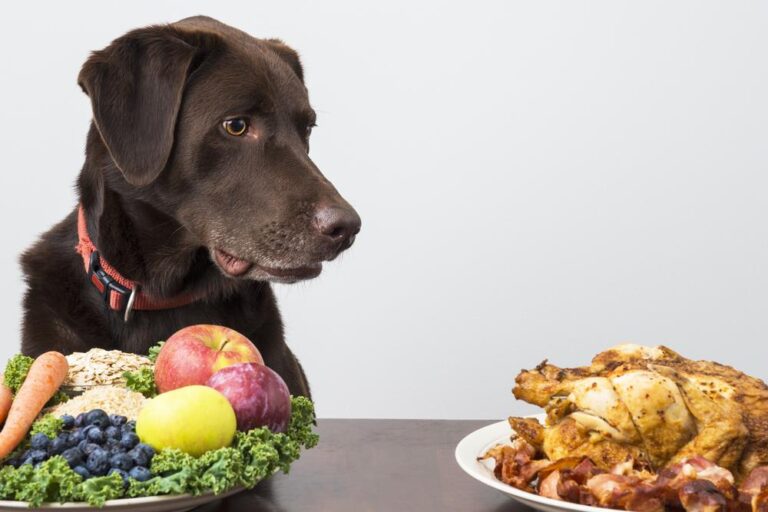Proper nutrition for the adult dog plays a crucial role in the life of our furry friend. And so it must be: the health of the dog is closely related to the diet. The physical well-being, vitality, and lifespan of the quadruped can be influenced and enhanced with the right food. Instead, poor nutrition can make the animal sick.
Being overweight, having diabetes, cardiovascular disease, skeletal and joint disease, kidney disease, and even cancer can all be triggered by an inadequate diet. No wonder the subject is so much in the spotlight, and there are almost as many opinions in the literature, guides, and forums on the internet about the correct nutrition of the adult dog as there are breeds.
What is the perfect food for my dog? There is no valid general answer to this question. After all, every dog is unique. Feeding requirements vary greatly depending on the size, age, health, weight, and activity level of the quadruped.
The perfect food for the pet must be the same for its owner. After all, you need to consider your living conditions, not just the needs of the quadruped. What is possible in everyday life for one person or another is a big challenge. Price, food procurement, and time certainly play an important role in deciding which feeding method is best.
It is important to be able to provide your dog with adequate long-term food. Because frequent food changes are often very stressful for the animal’s body. Diarrhea, bloating and other digestive problems can be the result of a drastic change in diet.
CONTENT:
- The role of calories in the proper nutrition of the adult dog
- Switching to adult food
- Essential nutrients in the proper nutrition of the adult dog
The role of calories in the proper nutrition of the adult dog
Before moving on to adult food, the question arises: what exactly does my adult dog need? As in humans, the dog’s caloric needs depend on sex, size, and activity level.
While professional athletes often consume 4,000 kcal or more per day, a person working in an office needs 2,000 kcal to cover their daily energy needs. The same is true for dogs: the “puppy” certainly needs less energy than a sled dog. For an ‘ordinary family dog’ without any particular problems, the following rule applies to calculating the required amount of calories: 57 kcal per kilogram of body weight.
Switching to adult food
In the first three to four weeks of life, a puppy is fed exclusively on breast milk. Gradually, he becomes accustomed to solid foods and receives special food that satisfies the high-calorie needs of young dogs. If you buy your dog from a serious breeder, you usually get a nutrition plan for the first few weeks. Many breeders even give the buyer some food for the home. After the sixth month, it is recommended to gradually reduce the energy density of the food, to avoid the dog developing too quickly. Also, a sudden increase in height often leads to joint problems such as hip and elbow dysplasia, which can create problems for the dog throughout his life.
After the puppy food, you can switch to either the junior food (young dog food) or the adult food (adult dog food). The transition to adult food should be made after the sixth or at the latest after the 18th month of life.
Small dogs should already be given adult food from 10 to 12 months when the increase in height is already complete.
Essential nutrients in the proper nutrition of the adult dog
Proteins, fats, carbohydrates, vitamins, and trace elements are the main nutrients that the dog can assimilate through his diet. They provide energy and keep all vital functions healthy. In contrast, a lack of nutrients can affect the entire body, bones, muscles and internal organs, leading to disease.
Carbohydrates
Carbohydrates are found in potatoes and cereals and are not one of the essential nutrients for the carnivorous dog. Commercially available dry food contains enough carbohydrates, so no extra dose is needed. If the dog feeds only on raw foods, it is best to give him cereals in the form of flakes, such as oatmeal or millet flakes.
Proteins
The most important source of energy for your dog is, without a doubt protein. Protein amino acids are essential for dogs. The best source of protein is meat. Thus, the dog’s food should contain at least 70% meat. In principle, almost all types of meat can be offered to the quadruped: beef, lamb, pork, rabbit, or bird. Among the organs, the liver, heart, kidneys, spleen, and rumen are recommended.
The dog’s need for meat is not accidental – it is a direct descendant of the wolf and belongs to the category of carnivorous predators. Strong chewing teeth and muscles, a relatively short intestinal tract, and rather aggressive digestive juices are perfectly designed for meat consumption. Meat should not be cooked so as not to distort the protein content and prevent it from losing its properties. Fresh, raw meat has the highest protein content.
As an alternative to meat, you can give fish to your dog twice a week. And it should be served as fresh as possible because this is the only way to contain the highest amounts of unsaturated fatty acids, easily digestible proteins, and vitamin D.
Vitamins and trace elements
Vitamins and trace elements, which are mainly found in vegetables, fruits, and herbs, should be found in a sufficient amount in the dog’s diet. Nutrients are interdependent. This means that using one nutrient entails the need to use another. A diet that is too one-sided, for example, based only on pure meat, is not recommended. The dog’s diet should include about 70% meat, 25% fruits, and only about 5% grains of vegetables. Celery, carrots, zucchini, squash, apples, pears or berries can be finely chopped or lightly boiled and then mixed with meat.
Fats
Unsaturated fatty acids in fish are very important in the proper nutrition of the adult dog, due to their anti-inflammatory properties and the fact that they help to improve the immune system. Dogs especially need Omega 3 fatty acids from animal fats. Also, Omega 6 fatty acids in vegetable oils are just as important and are found in a sufficient amount in meat.
Oils are very important because they help the dog’s body to assimilate essential vitamins. Therefore, vegetables should always be combined with animal oil, an example being salmon. However, to prevent obesity, the fat content of food must be significantly lower than that of protein and carbohydrates.
Walnuts also provide natural fatty acids. These can be given to the dog, to be shaved or ground.
Calcium
Calcium is found mainly in milk and dairy products. However, excessive amounts of calcium can be dangerous, especially for dogs that have not yet reached maturity. In the case of adult dogs, milk should not be on the menu, or only in small quantities. Cow’s milk should be avoided, as it often causes allergies or other intolerances.

